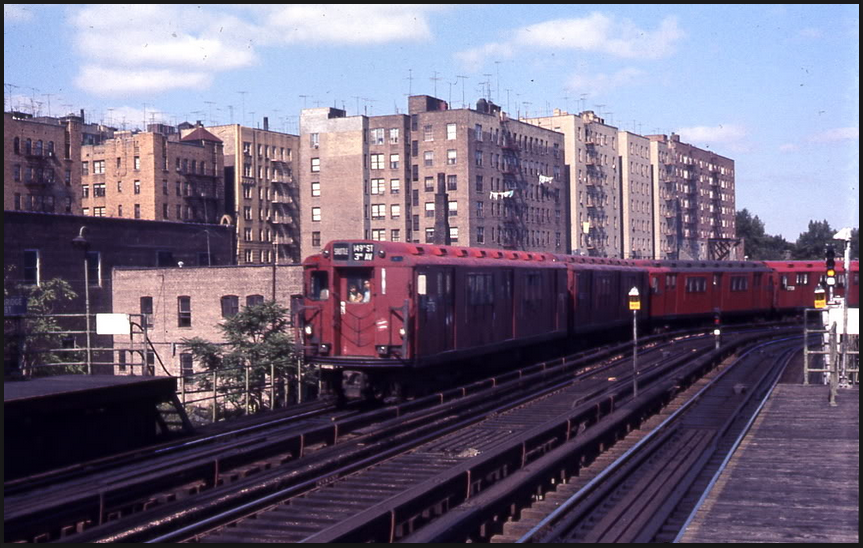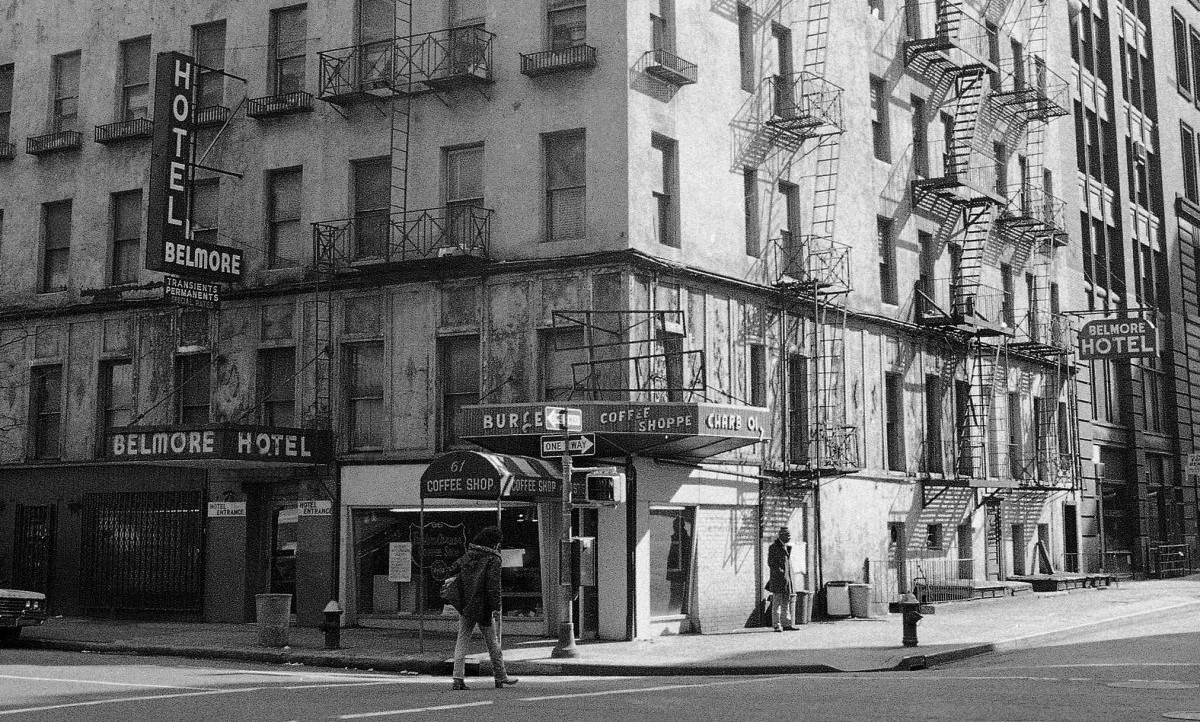A Voice of Baltimore Feature, an excerpt from
First-time novelist Margo Christie’s
second work — Memory Motel —
a novel in progress
set in mid-20th Century Charm City
By Margo Christie
I stayed in New York that Easter weekend after all, though not in the loft above my aunt’s club like I wanted.
After returning to the loft to find her husband dead, Aunt Gen checked us into the Piccadilly Hotel. She ordered club sandwiches delivered to the room, then returned to the loft to report Uncle Gus’s death without taking a single bite of hers.
Never again did we speak of Paris. Dreamy as I’d gotten dropping a coin into a Times Square fortune-telling machine to see if my trip abroad would come true, it no longer mattered after she took her leave and I perched on the windowsill, gazing 12 stories down at the bright lights and ceaseless flow of Broadway.
“Paris has nothing on this City That Never Sleeps,” I thought. I was born in New York. With Uncle Gus gone, I might just return, live with Auntie and be her helper and companion. I felt horrible thinking this — so willing was I to jump into a dead man’s shoes — but I’d never seen Broadway from such a thrilling vantage point before.
I was in bed but awake, thinking of what I might say to convince Daddy and Mom to let me stay, when Aunt Gen returned, stepped out of her shoes and crawled, fully clothed, into the twin bed opposite mine.
In the morning, over toast and coffee in the café off the hotel lobby, she said, “I’m sorry you didn’t get to see the club, but I couldn’t rise to the occasion of showing off anything. I hope the hotel didn’t disappoint you.”
I shrugged, unable to admit that it thrilled me last night and thrilled me still. I could’ve lingered in that café for hours, watching tourists gawk at the sheer height of the hotel, feeling apart from them by virtue of a birth certificate.
“I’m off from school this week, Aunt Gen. Maybe I could stay with you, help you take care of things.”
‘HOPELESS DREAMER’ ALISON BLANCHARD
I chuckled at the idea: Me, Alison Blanchard, labeled a “hopeless dreamer” by the nuns at Catholic High in Baltimore, soon-to-be personal assistant to a famous jazz singer.
Tapping her chin, Aunt Gen smiled like she thought the idea a fine one. Then her eyes moistened and she turned toward the window.
“Give your mother my apologies,” she said later, as she put me in a cab. “But I really must stay, attend to Gus’s funeral in the expected way.”
In a telegram delivered to the hotel this morning, Mom had suggested she stay a few days in Baltimore with us. But I wasn’t surprised to hear she wouldn’t: Baltimore was way too sleepy for her sophisticated tastes.
When I relayed her message, Mom said, “Of course I understand. Your auntie likes her privacy.”
We were in our station wagon, driving away from the train station. “The City is what she likes,” I clarified. “The hustle and bustle. This morning we sat in the hotel café, watching tourists while we sipped our coffee. Baltimore doesn’t have tourists, so naturally the hotels don’t have cafés.”
“Some do,” said Mom, a bit defensive. “Believe it or not, there are even, occasionally, tourists.” I’d been unfavorably comparing Baltimore to New York since she met me inside the much smaller train station.
I continued as though I hadn’t heard. “The hotel where Aunt Gen lived when she met Uncle Gus had a café, but it was on the side. This one was right off the lobby.”

The Interborough Rapid Transit (IRT) Subway Line’s Third Avenue El (also known as the Third Avenue Line and Bronx El) was the last to come down. Baltimore’s last “El” (i.e., Elevated streetcar track), torn down c.1950, was on Guilford Ave. north of Saratoga St.
We’d stopped at a red light and Mom turned a raised eyebrow on me. “How do you know where she lived when she met Uncle Gus?”
“She showed it to me once, from the elevated train. Did you know the Third Avenue El was the last to come down?”
Aunt Gen loved the Els. She’d insisted I ride one before they were all gone, so we rode all the way to the Bronx just to eat at the Arrow Restaurant on Fordham Road.
Mom’s look went from shocked to vaguely amused. “Well no, I didn’t know that. I so seldom go to New York.”
“Well, that’s your loss,” I said, triumphant.
Monument Street curved to the right and went from one-way to two. Mom focused on staying in her lane and just smiled.
Though Mom loved Aunt Gen as much as I did, she didn’t care for the City. She’d lived there long enough to give birth to me, but returned to Baltimore as soon as Daddy could arrange a transfer with his company. She didn’t like that people passed each other in the street without a glance or word, or that you had to go underground to catch a train nowadays.
“Auntie seems lonely. I think I should go back next weekend, help her get things done.”
“We’ll see. Your father may go. If so, I’m sure you can tag along.”
Arms crossed, I turned toward the window to watch the formstone row houses of East Baltimore fly by. Tagging along with Daddy was not what I’d had in mind. Though he was a native New Yorker like Aunt Gen, he liked the City no more than Mom.
As it turned out, Aunt Gen came to us. Though she’d made the arrangements from our room at the Piccadilly, where she took up residence for the week following Gus’s death, the funeral took place in Baltimore.
She’d never gotten on with his family, but had agreed to hold it in their Greek Orthodox Church to accommodate his sons. In a hasty telegram to Daddy, she wrote, “I won’t deny them what was denied me.”
I’D LEARNED OVER THE YEARS NOT TO QUESTION
I didn’t know what this meant. I didn’t worry myself over it, either. I’d learned over the years not to question Daddy about the untimely death of Grandpa Hank and how it was handled by Grandma Marylou.
“Will she stay with us?” is what I did ask, ever hopeful.
“If she stays at all, it will be in a downtown hotel,” said Daddy. “You know how she feels about Baltimore.”
Happy to see her no matter where she might stay, I anticipated Gus’s funeral with respectfully repressed joy.
The way things went, we barely saw each other. She stepped off the train at 10 that morning and back on again at a quarter to six. She didn’t spend the night or even attend the burial, but went straight from the church on Eastern Avenue to a bar near the train station with an old friend of Gus’s, who’d shown up at the funeral unexpected.
I didn’t fault her for wanting to get out of there. The women in Gus’s family were positively awful, whispering behind their veils that she wore a burgundy blouse under her all-black suit, refusing even to speak to her.
As for the men, they weren’t much better, grunting their rushed condolences as their wives stared holes in their backs. There was an issue concerning the casket. Tended to in New York by a mortician Auntie knew, it was delivered to the church tightly sealed. Gus’s only sister, a stout, silver-haired woman draped head-to-toe in black, halted in the aisle to stare, aghast, at the lidded casket on its altar.
NO WAKE! NO VIEWING!
“No wake! And now, not even a viewing!” she cried.
The murmurs in the pews went silent as people turned to stare and Mom moved quickly into the aisle to take the woman’s arm and whisper in her ear.
“No,” said the sister, shaking a finger. “That woman has never done my brother’s will! Has never done more than her own selfish will. Taking him from his family to run a show club in New York, like he gave a … a umph about that business! But what would you expect for a …”
This brought Daddy to his feet. “Now just a minute! That’s my sister!”
“For that, sir, I am sorry,” said Gus’s sister, crossing herself as she turned toward him.
Daddy started to say something, then plopped back down as the woman’s husband ambled up behind his wife, murmuring in Greek as he led her into their pew.
Later, after the priest calmed tempers and gave a shortened eulogy, focused mainly on the steadiness of Gus’s financial contributions, Mom and I stood in line to pray before the casket. Ahead of us, Gus’s sister nudged another woman.
“I won’t rest until I see my brother’s will with my own eyes,” she said, glancing over her shoulder to ensure we’d heard.
A RENEWED SENSE OF PRIDE IN MY FATHER
I glanced at Mom. She squeezed my hand to still me and I glanced at Aunt Gen, seated in a pew beside Daddy, her arm hooked through his. Through a veil of fine black lace embroidered with tiny pink rosettes, she stared straight ahead at the casket. In that moment, I felt a renewed sense of pride in my father, standing up for his sister like I’d never seen him do before.
On the church steps after the funeral, Aunt Gen lifted that glorious veil and leaned in to kiss my cheek. “That witch might rest well and soon…,” she whispered in my ear, “… to know Gus isn’t even in that box.” Here, she tossed her head at the casket, as it was getting shoved into the back of the hearse. Then she clicked down the stone steps and into the car of the friend who’d shown up unexpected.
I took this to mean that The Gus We’d Known Here on Earth was not in that box. Gus’s body was nothing but a hollow shell, his soul having passed into heaven. Aunt Gen had her views on Catholics and the afterlife, but I hadn’t yet escaped the teachings of the nuns at Catholic High.
Aunt Gen’s next communiqué set me straight — Gus’s real dying wish was to have his remains scattered on a parcel of land in Eastern Baltimore County, which he still held the deed to, though his family believed it to have been sold long ago.
That night, as I stood at the top of the stairs, about to go down for a glass of milk, I heard Mom say, “So that was where she went with Gus’s, uh …” I took a seat on a step and huddled into my knees.
‘THOSE WERE THE MAN’S ASHES’
“Ashes,” provided Daddy. “Those were the man’s ashes. And how is it that you know where she went?”
“Puzzling the pieces together,” said Mom. “The stranger she left with, that friend of Gus’s…”
Daddy harrumphed.
“Now, Henry, you of all people should know she was doing Gus’s will. Or should I suppose you believe what that shrew, his sister, said?”
“Hold your tongue,” scolded Daddy. “Need I remind you that we are still Catholics? Never mind my sister’s wild ideas and how they changed Gus. What Genevieve did was indecent, fooling the man’s family like that.”
Things quieted. I rose, then heard Mom’s voice again, as lighthearted as the memory it invoked:
“How Gus did change! Your sister said he didn’t get ill until several years after they married, but I swear I never saw a man go from gray to pink in less time than Gus Stavropoulos did when he moved into that old hotel with Geneva.”
“Motel,” Daddy scoffed. “A place like that is a motel. And her name is Genevieve, I don’t care what she calls herself on stage.”

“A nondescript structure on Lexington Avenue at 23rd Street, it had a sign attach- ed to the Lex. Avenue side” which read “HOTEL” in capital letters top-to-bottom.
Like Grandma Marylou, he didn’t approve of Aunt Gen’s singing career. As for the hotel being a motel, on this he was dead wrong: I’d seen the place Auntie lived in when she met Gus. A nondescript structure on Lexington Avenue at 23rd Street, it had a sign attached to the Lex. Avenue side — which read “HOTEL” in capital letters top-to-bottom beside an arrow that shot downward then curved, pointing to the entrance around the corner.
I concluded that Daddy, like Grandma, had opinions aplenty about Aunt Gen’s New York City life, but very few facts.
As for me, I loved New York and couldn’t wait to go back. I found it charming that Aunt Gen went by different names and lived for short times in hotels.
It proved she didn’t fit into molds, and I was on the verge of claiming the same for myself.
margochristie@hotmail.com
EDITOR’S NOTE:
First-time author Margo Christie — whose semi-autobiographical novel, These Days: A Tale of Nostalgia on a Burlesque Strip, won second prize in Amazon’s Breakthrough Novel Award competition in 2012 and was stamped “as original as it is addictive” by Publisher’s Weekly Independent Review — grew up performing on Baltimore’s once-famous “Block” in the late 1970s as the teenage girlfriend of a charismatic older man, before moving in 1999 to Denver, where she recently got married, and has moved again, this time to Tampa.
An early chapter of her second novel, currently in progress, is excerpted above. She comes back frequently to Baltimore to visit — the place she still calls “home.”
Check out her most recent Voice of Baltimore contribution, an insightful book review: click here







August 15th, 2016 - 10:02 PM
Very nicely written. I’m a sucker for fiction with real people.
August 16th, 2016 - 2:51 PM
Thanks, Mr. Rostaing. Hoping to find more folks who read like you.